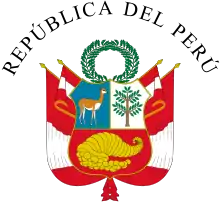Liberty Movement
Liberty Movement Movimiento Libertad | |
|---|---|
| President | Mario Vargas Llosa |
| Founded | 1987 |
| Dissolved | 1993 |
| Ideology | Economic liberalism Libertarianism Liberal democracy Republicanism |
| Political position | Center-right |
 |
|---|
| This article is part of a series on the politics and government of Peru |
| Constitution |
|
|
Peru
Liberty Movement (in Spanish: Movimiento Libertad), was a political party in Peru founded in 1987 by groups opposing the nationalization of the banking sector in 1986. Instead it advocated a free market approach to solving Peru's hyperinflation, which peaked at over 7000%.
It was first formed in 1988 together with Popular Action and Christian People's Party, FREDEMO. In 1990 FREDEMO launched the Movimiento Libertad led by Mario Vargas Llosa as its presidential candidate. It was an attempt to make alliances between libertarian and the conservative right-wing factions. It led to a break between Vargas Llosa and Hernando de Soto.
The party was defeated by Alberto Fujimori in 1990.
After Mario Vargas Llosa abandoned politics and left the country, the movement was dissolved. Most former members joined PPC, AP, or the new political parties that arose for the 1995 presidential elections.
Many years later, a group of former member of this party founded in Lima, in April 2003, a new political movement called Libertarian Party of Peru (in Spanish Partido Liberal del Peru]). Its founding members are Jose Luis Tapia, Humberto Perez, Fernando Barrios, Myriam Ortiz, and Alberto Mansueti.
USA
A Liberty Movement surfaced in the United States, before or during the 2008 United States presidential campaign of Ron Paul who had also then founded a Campaign for Liberty, in Sept 2009 published The Revolution: A Manifesto[1] and in January 2012 published Liberty Defined.[2] At least this 2012 Ron Paul movement[3] attracted many politically active followers who variously ran for office and won, one example being Eric Brakey who became State Senator for the Maine district including New Gloucester, Maine, and many others who became Ron Paul delegates sent to the 2012 Republican National Convention. (This Liberty Movement had apparently nothing to do with the prior South American Liberty Movement unless such references are found in writings of Ron Paul).
This American Liberty Movement is similar to but in no way officially aligned with the Tea Party movement, Patriot movement and others of similar conservative leanings, even though they all appear to express similar small government views striving to conserve strict adherence to Constitutionally statutory Rights, Enumerated Powers but most specifically the whole host of Unenumerated Powers protected from federal infringement by Amendment 5 and State infringement by Amendment 14.
References
